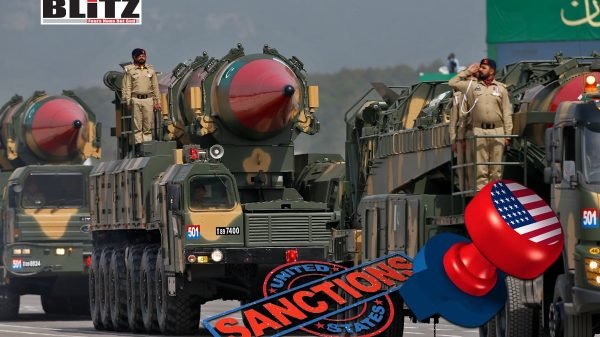US sanctions on Pakistan’s missile program strain relations
- Update Time : Monday, December 23, 2024

In a significant move that has added fresh strain to already complicated US-Pakistan relations, Washington has imposed sanctions on several Pakistani entities, including the state-owned National Development Complex (NDC). The sanctions, announced earlier this week by the US State Department, target Pakistan’s long-range ballistic missile program, citing concerns over proliferation risks and potential threats to global and regional stability.
The NDC, identified as central to Pakistan’s development of the Shaheen series of ballistic missiles, now faces asset freezes and transaction bans with US entities. Accompanying this decision, US Deputy National Security Advisor Jon Finer expressed concerns about the nation’s advancements in long-range missile technology, stating that Pakistan’s capabilities pose “serious questions” about its intentions. This escalation has reignited debates surrounding the balance of power in South Asia and the broader implications for US foreign policy.
The sanctions primarily target the NDC but extend to three Karachi-based companies-Akhtar and Sons Private Limited, Affiliates International, and Rockside Enterprise-for their alleged roles in bolstering Pakistan’s missile development efforts. These entities are accused of facilitating access to advanced rocket-motor testing equipment and other technologies critical to the development of long-range ballistic systems.
This is not the first time the US has taken punitive measures over Pakistan’s missile program. Earlier this year, sanctions were also placed on foreign entities, including a Chinese research institute, for allegedly aiding Pakistan’s missile technology initiatives. Such actions underscore Washington’s growing unease over the technological advancements in Islamabad’s missile arsenal.
US State Department spokesman Matthew Miller reinforced these concerns, stating on Dec 19 that the US has been “clear and consistent” in its opposition to weapons proliferation. While the US has pledged to engage constructively with Pakistan on the issue, the current sanctions mark a clear escalation in its stance.
Unsurprisingly, the sanctions have provoked a sharp response from Islamabad. The Ministry of Foreign Affairs condemned the measures as baseless and accused the US of applying “double standards” in its approach to arms proliferation. Pakistan’s officials argue that the country’s missile program is defensive in nature, designed to ensure regional stability and deter aggression in a volatile South Asian security environment.
The Ministry further warned of the “dangerous implications” these sanctions could have on the region’s strategic stability. Islamabad’s stance reflects a deep frustration with what it perceives as a selective application of non-proliferation principles, particularly as the US continues to supply advanced military technologies to its allies in the region, such as India.
Adding to the domestic uproar, Zulfiqar Bukhari, a spokesperson for imprisoned former Prime Minister Imran Khan, criticized the Biden administration on social media platform X. He called the sanctions an unjustified attack on Pakistan’s sovereignty and accused the US of undermining regional stability rather than contributing to it.
The sanctions arrive at a time when Pakistan is already grappling with severe economic and political crises. The country’s deteriorating economy, coupled with internal political instability, makes it particularly vulnerable to external pressures. Sanctions targeting critical defense and commercial sectors further complicate Pakistan’s ability to maintain its military readiness and strategic posture in the region.
For decades, Pakistan has maintained that its missile program is essential for balancing the regional power dynamics, particularly in response to India’s growing conventional and nuclear capabilities. India’s rapid modernization of its military arsenal, supported by partnerships with the US and other Western nations, has long been a point of contention for Islamabad. In this context, the development of long-range ballistic missiles, such as the Shaheen series, is seen as a necessary countermeasure.
However, Washington’s concerns extend beyond South Asia. The US argues that advancements in Pakistan’s missile program could have global ramifications, particularly if the technology is shared with other nations or non-state actors. This concern is amplified by Pakistan’s history of proliferation-related controversies, including the infamous AQ Khan network.
Critics of the sanctions point to what they describe as hypocrisy in the US’s approach to arms control and non-proliferation. While Washington penalizes Pakistan for its missile program, it continues to grant exemptions and provide cutting-edge military technology to allies like India, Israel, and certain NATO members.
This perceived bias fuels resentment in Pakistan and other countries that face similar punitive measures. It also complicates US efforts to maintain a balanced relationship with Pakistan, a nation that has historically played a crucial role in American geopolitical strategies, including during the Cold War and the War on Terror.
The sanctions mark yet another low point in the increasingly strained US-Pakistan relationship. While the two nations have cooperated on counterterrorism and regional security in the past, their ties have soured in recent years due to a range of issues, including US accusations of Pakistan harboring militant groups and Islamabad’s growing closeness to Beijing.
By targeting Pakistan’s missile program, Washington risks pushing Islamabad further into China’s orbit. Beijing has already emerged as Pakistan’s primary defense partner, providing critical military and economic support through initiatives such as the China-Pakistan Economic Corridor (CPEC). The latest sanctions may accelerate this shift, weakening US influence in South Asia.
The broader implications of the sanctions cannot be ignored. In a region already marked by high tensions between nuclear-armed rivals India and Pakistan, any disruption to the delicate strategic balance could have catastrophic consequences. Pakistan’s Ministry of Foreign Affairs has warned that the sanctions could destabilize the region, potentially triggering an arms race or escalating existing hostilities.
Moreover, the measures may undermine Pakistan’s ability to engage in constructive dialogue with the US on arms control and non-proliferation. Instead of fostering cooperation, the sanctions risk deepening mistrust and reducing the likelihood of a diplomatic resolution to the underlying issues.
The US sanctions on Pakistan’s missile program represent a complex intersection of strategic, political, and economic factors. While Washington views the move as necessary to curb proliferation risks and protect global security, Islamabad perceives it as an unjustified attack on its sovereignty and national security.
As the two nations navigate this latest challenge, the broader implications for regional stability and US-Pakistan relations remain uncertain. For Pakistan, the sanctions underscore the need for self-reliance and diversification of its defense partnerships. For the US, they highlight the delicate balancing act required to address proliferation concerns without alienating a historically important, albeit contentious, partner.
Whether this escalation leads to constructive dialogue or further discord will depend on the willingness of both sides to engage in meaningful negotiations. In the absence of such efforts, the risk of unintended consequences-both regionally and globally-will only grow.














Leave a Reply